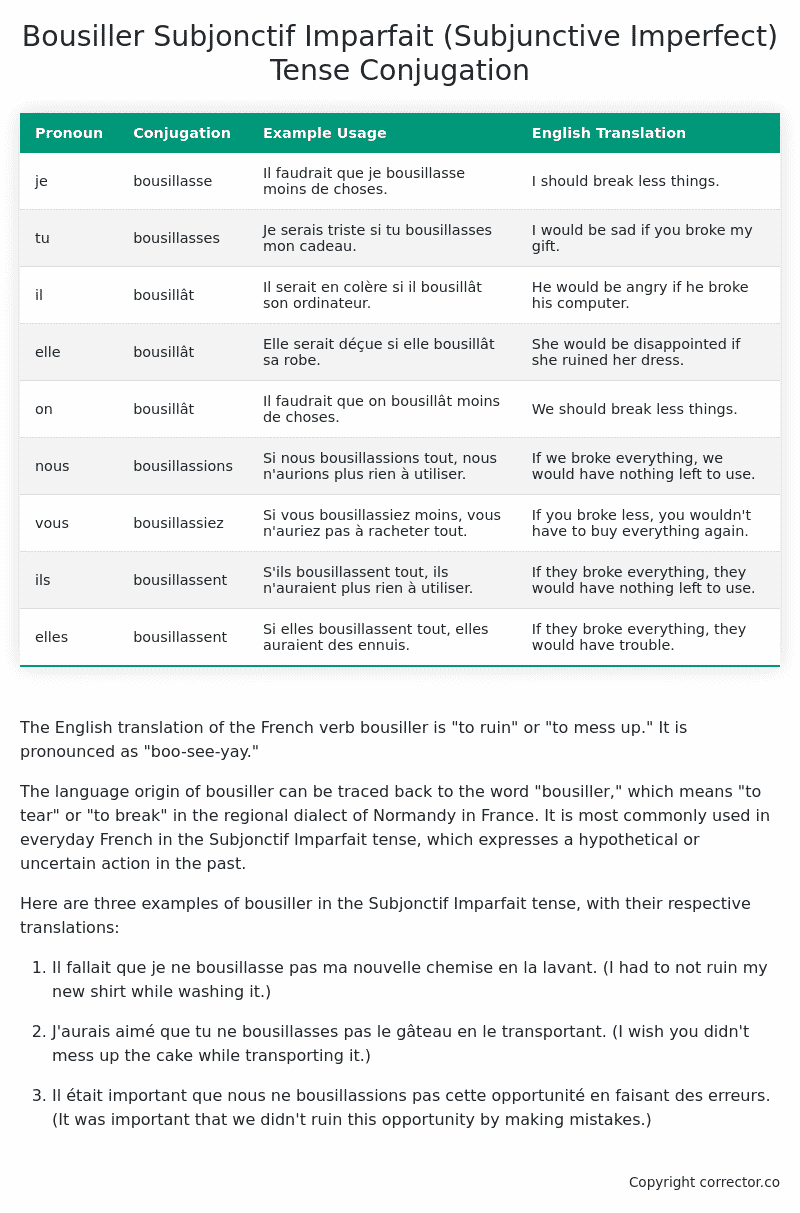Subjonctif Imparfait (Subjunctive Imperfect) Tense Conjugation of the French Verb bousiller
Introduction to the verb bousiller
The English translation of the French verb bousiller is “to ruin” or “to mess up.” It is pronounced as “boo-see-yay.”
The language origin of bousiller can be traced back to the word “bousiller,” which means “to tear” or “to break” in the regional dialect of Normandy in France. It is most commonly used in everyday French in the Subjonctif Imparfait tense, which expresses a hypothetical or uncertain action in the past.
Here are three examples of bousiller in the Subjonctif Imparfait tense, with their respective translations:
-
Il fallait que je ne bousillasse pas ma nouvelle chemise en la lavant. (I had to not ruin my new shirt while washing it.)
-
J’aurais aimé que tu ne bousillasses pas le gâteau en le transportant. (I wish you didn’t mess up the cake while transporting it.)
-
Il était important que nous ne bousillassions pas cette opportunité en faisant des erreurs. (It was important that we didn’t ruin this opportunity by making mistakes.)
Table of the Subjonctif Imparfait (Subjunctive Imperfect) Tense Conjugation of bousiller
| Pronoun | Conjugation | Example Usage | English Translation |
|---|---|---|---|
| je | bousillasse | Il faudrait que je bousillasse moins de choses. | I should break less things. |
| tu | bousillasses | Je serais triste si tu bousillasses mon cadeau. | I would be sad if you broke my gift. |
| il | bousillât | Il serait en colère si il bousillât son ordinateur. | He would be angry if he broke his computer. |
| elle | bousillât | Elle serait déçue si elle bousillât sa robe. | She would be disappointed if she ruined her dress. |
| on | bousillât | Il faudrait que on bousillât moins de choses. | We should break less things. |
| nous | bousillassions | Si nous bousillassions tout, nous n’aurions plus rien à utiliser. | If we broke everything, we would have nothing left to use. |
| vous | bousillassiez | Si vous bousillassiez moins, vous n’auriez pas à racheter tout. | If you broke less, you wouldn’t have to buy everything again. |
| ils | bousillassent | S’ils bousillassent tout, ils n’auraient plus rien à utiliser. | If they broke everything, they would have nothing left to use. |
| elles | bousillassent | Si elles bousillassent tout, elles auraient des ennuis. | If they broke everything, they would have trouble. |
Other Conjugations for Bousiller.
Le Present (Present Tense) Conjugation of the French Verb bousiller
Imparfait (Imperfect) Tense Conjugation of the French Verb bousiller
Passé Simple (Simple Past) Tense Conjugation of the French Verb bousiller
Passé Composé (Present Perfect) Tense Conjugation of the French Verb bousiller
Futur Simple (Simple Future) Tense Conjugation of the French Verb bousiller
Futur Proche (Near Future) Tense Conjugation of the French Verb bousiller
Plus-que-parfait (Pluperfect) Tense Conjugation of the French Verb bousiller
Passé Antérieur (Past Anterior) Tense Conjugation of the French Verb bousiller
Futur Antérieur (Future Anterior) Tense Conjugation of the French Verb bousiller
Subjonctif Présent (Subjunctive Present) Tense Conjugation of the French Verb bousiller
Subjonctif Passé (Subjunctive Past) Tense Conjugation of the French Verb bousiller
Subjonctif Imparfait (Subjunctive Imperfect) Tense Conjugation of the French Verb bousiller (this article)
Subjonctif Plus-que-parfait (Subjunctive Pluperfect) Tense Conjugation of the French Verb bousiller
Conditionnel Présent (Conditional Present) Tense Conjugation of the French Verb bousiller
Conditionnel Passé (Conditional Past) Tense Conjugation of the French Verb bousiller
L’impératif Présent (Imperative Present) Tense Conjugation of the French Verb bousiller
L’infinitif Présent (Infinitive Present) Tense Conjugation of the French Verb bousiller
Struggling with French verbs or the language in general? Why not use our free French Grammar Checker – no registration required!
Get a FREE Download Study Sheet of this Conjugation 🔥
Simply right click the image below, click “save image” and get your free reference for the bousiller Subjonctif Imparfait tense conjugation!

Bousiller – About the French Subjonctif Imparfait (Subjunctive Imperfect) Tense
Formation
Common Everyday Usage Patterns
Interactions with Other Tenses
Subjonctif Présent
Indicatif Passé Composé
Conditional
Conditional Perfect
Summary
I hope you enjoyed this article on the verb bousiller. Still in a learning mood? Check out another TOTALLY random French verb conjugation!


